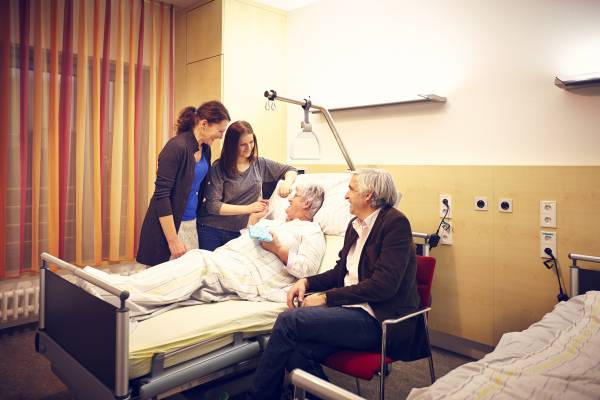For the past two weeks, I’ve been unfortunate enough to spend a lot of time in the ICU and rehab visiting my dad. The experience has made me realize that when you’re surrounded by sick people, you’ve got to figure out ways to keep yourself healthy.
Not only do you need to be able to help out your loved one as he or she recovers, but you will be better able to deal with the stress and mental exhaustion of the situation if you take care of yourself physically. So, what are some of the things you can do?
For the past two weeks, I’ve been unfortunate enough to spend a lot of time in the ICU and rehab visiting my dad. The experience has made me realize that when you’re surrounded by sick people, you’ve got to figure out ways to keep yourself healthy.
Not only do you need to be able to help out your loved one as he or she recovers, but you will be better able to deal with the stress and mental exhaustion of the situation if you take care of yourself physically. So, what are some of the things you can do?
Wash Your Hands
This sounds basic, but when you’re stressed out of your mind, you can forget to do the small things. Most hospitals have antibacterial gel dispensers mounted on the walls near the elevators and exit doors. I usually avoid these gels because I don’t want to kill my good cooties, but when I’m living in an environment that breeds disease, you can bet I’m taking advantage of the gel pumps.
Bring Your Own Snacks
My mom’s friends were kind enough to visit us in the ICU and bring care packages that included candy. If I hadn’t brought apples and almonds in my purse, it would have been easy to nosh on all that sugar. I’m not saying I didn’t indulge occasionally, but by having better options on hand, I could make better choices.
“[Y]ou will be better able to deal with the stress and mental exhaustion of the situation if you take care of yourself physically.”
Sleep When You Can
I hear similar advice being given to newborn mothers and it’s totally applicable here, too. When your patient is asleep and you’re not talking to doctors, try to catch a nap. I promise that you will not get a full night’s sleep when you’re staying over in the ICU, and you probably won’t sleep well even if you go home for a night. So take your twenty-minute power nap or fall asleep in the waiting room. It’s okay.
RELATED: 5 Tips for Better Sleep and a Healthier Mind and Body
Bring a Book
Technology is great and I use it in most aspects of my life, but it can also dumb us down. A real book can offer an escape, and you won’t have the blue light from your cell phone screen messing with your already compromised ability to sleep.

Get Up and Move
Take the stairs, walk the hallways, or get up and stretch. Just do something. You might not have time for workouts, but you need to make time for some simple movement in your day. You’re going to be hunched over your loved one’s bed or cramped in an uncomfortable chair to sleep. You feeling achy and sore will not help you help your patient.
READ: 11 Sneaky Ways to Move Every Day
Take Time
Take time to meditate, pray, or just get some deep breaths. You will have the opportunity when your family member is out getting scanned or examined. Take three to five minutes to yourself. Finding your center will help you through this.
Ask for Help
You don’t have to do this alone. Find a friend or family member who can come sit with you for a while. Or if a family member is already with your patient, ask a friend to meet you for coffee.
Even if it’s downstairs in the hospital café, you are getting a break and being reassured that you have support. If you don’t have friends or family around, don’t be afraid to talk to the hospital chaplain or a pink lady.
Let Things Go
In my family, I am the laid back one, but by the rest of the world’s standards I am fairly type-A and can be content in my routines. When you’re at the hospital for ten to eighteen hours per day, that schedule goes out the window – and that’s okay.
Do the neighbors really care that I take down my Halloween decorations and put up my Thanksgiving ones on the first day of November? No. And if they do, they have bigger problems than you need to worry about.
“I am an optimistic person the majority of the time, but sometimes life deals you or your loved ones a crap hand, and it’s okay to be pissed about it.”
Make a List
I know this sounds counterintuitive to what I just said about letting things go, but hear me out. Some things still need to get done or at least need to be written down so you can tackle them when the crisis has passed.
Between the lack of sleep, medical jargon, and being in a constant state of worry and grief, I have barely been able to hold a thought in my head. I’m sure there are things I forgot to do last week. Hopefully, none of them were critical. Don’t make the list to drive yourself crazy, but do have a list of important things like paying the mortgage and property taxes.

Practice Patience
This one can be hard. You’re on sensory overload and you’re not getting all of the information you want. Take a few deep breaths and walk away instead of tearing into the nurse. For this one, it’s good to have back up.
During these weeks, there were times when we did not believe my dad was receiving the best care. At those times, my sister and I would take turns questioning the doctors, nurses, and technicians. We would base our turns on whoever was calmer at the time. Remember, you get more bees with honey, and it’s always best to practice kindness.
RELATED: Patience Is a (Training) Virtue
Embrace the Suck
I am an optimistic person the majority of the time, but sometimes life deals you or your loved ones a crap hand, and it’s okay to be pissed about it. I definitely cried, went for an angry run, and questioned how this could be happening.
Take the time to be mad. If you believe in a higher power, it’s okay to question him/her/it and get angry. So cry into your pillow, go spin until your legs want to fall off, and then regroup and come up with a plan on how you’re going to deal with these changes to your life.
Photos courtesy of Shutterstock.






